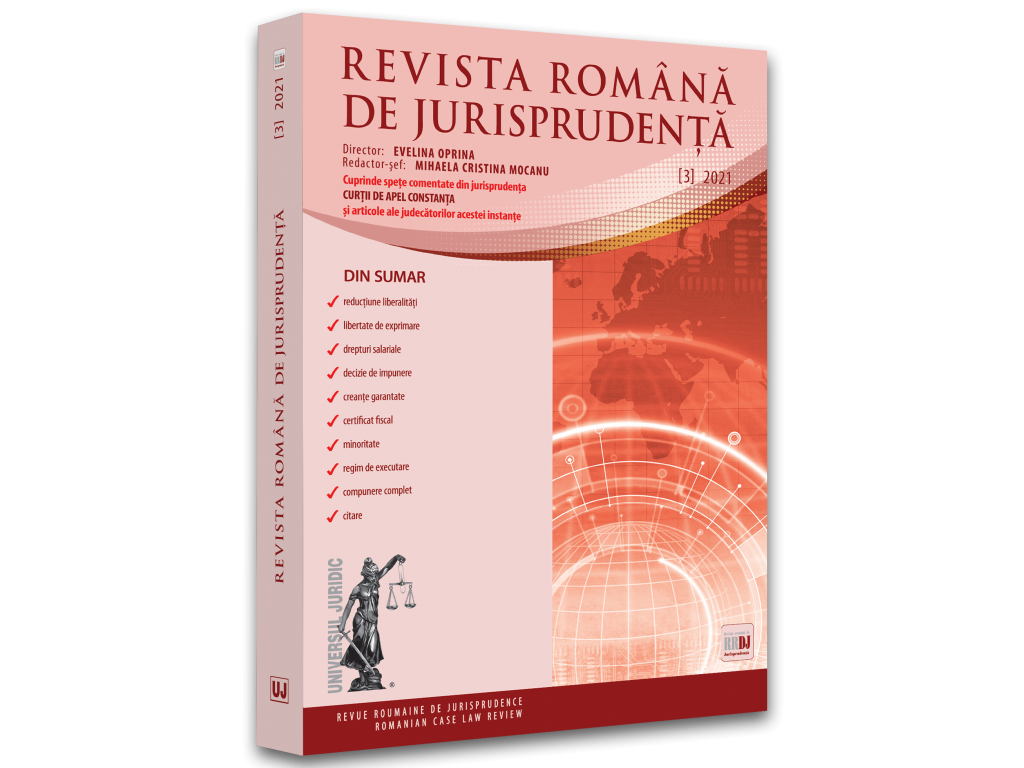Reflection of the unlawful composition of the trial panel in criminal procedural matters in the practice of national courts and the jurisprudence of the Constitutional Court of Romania
DEZBATERI
Abstract
Recent jurisprudential approaches bring back into the discussion of legal practitioners the varied and complex issues related to the legal composition of criminal trial panels, discussions noted in the doctrine being also encouraged by some decisions of the Constitutional Court of Romania, pronounced in resolving some referrals that had as object exceptions of unconstitutionality or legal conflicts of constitutional nature arising between public authorities, according to Article 146 letters d) and e) of the Constitution.
By Decision no. 685/07.11.2018, the CC found the existence of a first legal conflict of a constitutional nature between the Parliament, on the one hand, and the High Court of Cassation and Justice, on the other hand, generated by the decisions of the Management College of the the High Court of Cassation and Justice, by which, starting with Decision no. 3/2014, only four of the five members of the five-judge panels were appointed by lot, contrary to the requirements of Article 32 of Law No. 304/2004 on the organisation of the judiciary, as subsequently amended.
In addition, by Decision No 417/03.07.2019, the CC found that there was another legal conflict of a constitutional nature between the Parliament, on the one hand, and the High Court of Cassation and Justice, on the other hand, arising from the failure of the the High Court of Cassation and Justice to set up specialised court panels for the trial at first instance of corruption offences under Law No 78/2000 for the prevention, detection and punishment of corruption offences.
In another decision, namely no. 27/22.01.2020, pronounced on the request for resolution of the legal conflict of a constitutional nature between the Romanian Parliament, on the one hand, and the High Court of Cassation and Justice, on the other hand, the CC found that there is no legal conflict of a constitutional nature between the Romanian Parliament and the the High Court of Cassation and Justice, arising from the composition of the three-judge panels of the criminal division of the the High Court of Cassation and Justice.
In a relatively recent decision, delivered under no. 129/02.03.2021, the CC defined the legal composition of the trial panel and held, in essence, that this phrase refers to the number of judges forming the trial panel, to the separation of judicial functions and to the continuity of the trial panel, indicating also the procedural sanction that intervenes in case of non-compliance with the relevant legal provisions as that of absolute nullity.
Even if the intervention of the CC had the role of clarifying, at least at a theoretical level, some of the problems faced by the Romanian courts, the issues at stake continue to generate controversy and difficulties in understanding or applying some domestic procedural rules, whose lack of precision has even been sanctioned by the ECHR in some decisions rendered against Romania.
In this context, it would be particularly useful for the national legislator to intervene and define the notion of „legal composition of the panels”, thus ensuring a correspondence between the active substance of the legislation and the decisions rendered by the CC in the exercise of the powers provided for in Article 146(d) and (e) of the Romanian Constitution, even if certain legal provisions have not been declared unconstitutional in the exercise of this control.
Following the decisions of the ECHR, it would also be necessary to supplement the rules of non-matching in Article 351 of the Criminal Procedure Code, with special reference to the method of administering evidence in the event of a change in the composition of the trial panel, especially since this change is allowed until the start of the proceedings, according to Article 354 para. (2) of the Criminal Procedure Code.
Although in the view of the national legislator, in the event of a change in the composition of the panel, it would not be necessary to produce again the evidence before the new panel, not even the essential evidence, since it would be sufficient for the judges who will give the final decision on the merits of the case to hear the parties' arguments, this conception cannot ensure the fairness of the trial procedure from a conventional perspective.
In such circumstances, and in the light of the judgments of conviction handed down against Romania by the ECHR, it is obvious that the national standard imposed on the right to a fair trial offers less protection to the accused and other participants in the criminal proceedings than that enshrined by the ECHR in its interpretation of Article 6 of the Convention, which makes the task of national courts all the more difficult.
At the same time, however, as the established case law shows, the European Court has not established the need to re-administer all the evidence previously given before the panel in a partially different composition, made up of professional judges, when the written statements of those persons are on file.
This is precisely why courts in Romania and elsewhere should avoid engaging in a rigid process of interpretation and application of domestic procedural rules, which could even run counter to the values protected by the Convention, as this runs the risk of violating other requirements of the right to a fair trial, including the right to a reasonable time for the resolution of cases.
Keywords: trial panels, illegal composition, Constitutional Court








